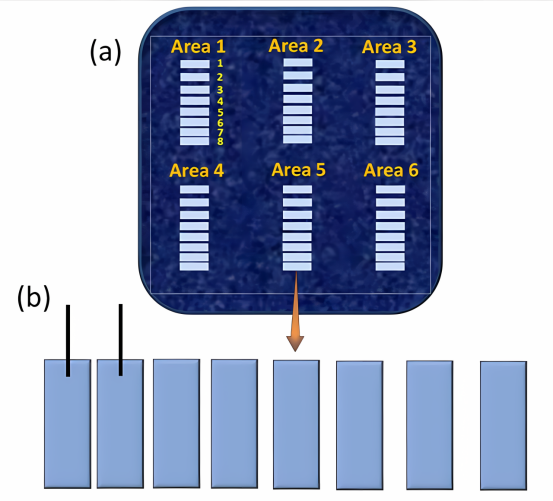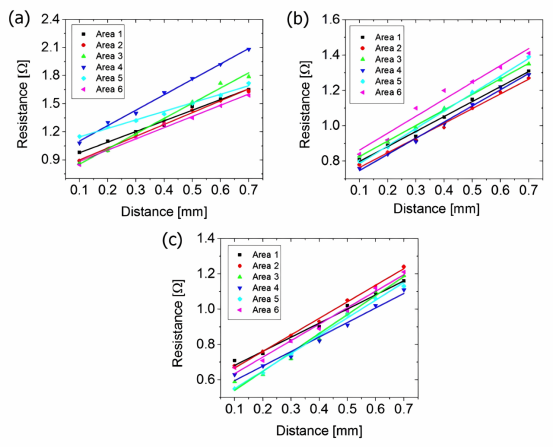
量子效率测试仪
PL/EL一体机
Sinton硅片少子寿命测试仪
Sinton硅块少子寿命测试仪
绒面反射率测试仪
3D共聚焦显微镜
在线四探针方阻测试仪
全自动扫描四探针方阻测试仪
在线薄膜厚度测试仪
晶化率测试仪
Horiba显微共焦拉曼光谱仪
傅里叶红外光谱仪
霍尔效应测试仪
分光光度计
全光谱椭偏仪
Horiba椭圆偏振光谱仪
TLM接触电阻率测试仪
超景深显微镜
网版智能影像测量仪
全自动影像测量仪
卧式拉力机
电池片稳态光衰老化试验箱
电池片紫外老化试验箱
电池片拉脱力综合测试仪
外观检验台
湿漏电测试系统
组件实验室EL测试仪
紫外老化试验箱
稳态光衰老化试验箱
电流连续性监测系统
PID测试系统
旁路二极管测试系统
LeTID测试系统
反向电流过载系统
脉冲电压测试系统
绝缘耐压测试仪
接地连续性测试仪
绝缘耐压接地测试仪
湿热环境试验箱
湿冻环境试验箱
热循环试验箱
动态机械载荷测试机
静态机械载荷测试机
冰雹冲击试验机
引出端强度试验机
霰弹冲击试验机
抗划伤(切割)测试机
剥离试验机
万能材料试验机(单臂)
万能材料试验机(双臂)
光伏玻璃透过率测试仪
醋酸测试试验箱
交联度测试系统
二极管接线盒综合测试仪
落球冲击试验机
半自动四探针
全自动探针式台阶仪
多通道太阳能MPPT系统
Horiba稳瞬态荧光光谱仪
大面积钙钛矿方阻椭偏二合一测试仪
大面积钙钛矿影像显微二合一监测站
钙钛矿P1激光划线测试仪
钙钛矿在线PL测试仪
钙钛矿在线方阻测试仪
钙钛矿在线膜厚测试仪
钙钛矿工艺检测工作站
手持式IV测试仪
便携式EL测试仪
手持热成像测试仪
户外组件多通道测试系统
光伏逆变器电能质量测试仪
无人机EL检测仪
IV测试仪
IVEL分选机
掺杂分布对太阳能电池薄膜方阻和接触电阻的影响
日期:2024-08-27浏览量:585
在太阳能电池的研究中,提高电池的光电转换效率是至关重要的目标。四点探针法和TLM 传输法两种测试方法在研究晶硅太阳能电池的薄膜方阻均一性和掺杂前后接触电阻变化起到了重要作用。「美能光伏」在线方阻测试仪,是专为光伏工艺监控设计的,可以获得太阳能电池不同位置的方阻分布信息;TLM接触电阻测试仪,能够快速、灵活、精准的测量太阳能电池的接触电阻和线电阻,反映扩散、电极制作、烧结等工艺中存在的问题。
四点探针法测量

薄膜方阻测量示意图
在测量中,选择太阳能电池上的五个不同位置。如图(b)所示,将固定电流源连接到四探针测量仪的外探头,使用电压表测量来自内探头的电压(V),以确定样品薄膜方阻(R)。
太阳能电池的薄膜方阻分析
在晶硅太阳能电池的制备中,测量薄膜方阻可以评估掺杂是否均匀。

不同扩散时间下的薄膜方阻
所有掺杂磷的硅片都表现出明显的方阻降低。一般来说,未掺杂的硅片具有非常高的电阻;然而,当掺杂磷原子时,其方阻急剧降低。从表中可以看出,扩散时间20min的硅片在不同位置的薄膜方阻非常接近,表明硅片在扩散过程中被磷原子均匀掺杂。随着磷掺杂扩散时间的增加,平均方阻显著减小。

不同掺杂时间下硅片平均薄膜方阻的变化
通过柱状图的形式呈现了 Wafer - 1、Wafer - 2 和 Wafer - 3 在不同扩散时间后测得的薄膜方阻。随着磷掺杂扩散时间的增加,平均方阻显著减小。在扩散时间10、15、20min下,Wafer - 1的平均方阻为 89.20Ω/□,Wafer - 2为 68.35Ω/□,Wafer - 3为 49.68Ω/□。
传输线法(TLM)测量
接触电阻是衡量金属与半导体欧姆接触质量的关键参数,通过对接触电阻的研究计算可以反映扩散、电极制作和烧结等工艺中存在的问题。金属-半导体接触中的电流可以横向或纵向传输。电流横向传输:方块电阻。电流纵向传输:接触电阻。

六种不同栅线间距的TLM测试方案示意图
图中展示了测量电阻的方法:改变相邻栅线之间的距离,从 0.1mm 到 0.7mm,每次增加 0.1mm。通过改变电极间距可以得到总电阻和电极间距的关系,从而提取出界面接触电阻 Rc和所研究材料的方阻Rs。
太阳能电池的前接触电阻分析

TLM模式的接触电阻(Rc)和接触电阻率(ρc)值

不同栅线间距和前接触电阻的线性回归分析曲线
通过传输线方法(TLM)测量了硅片的前接触电阻,结果表明,随着扩散时间增加,即掺杂浓度增加,前接触电阻减小。
影响前接触电阻的参数有掺杂特性、银浆类型和烧成配方等,其中掺杂特性是影响前接触电阻的主要因素。增加掺杂时间可以增加磷的掺杂浓度,但过度掺杂超过了硅的固溶性,形成电阻无活性的死层。死层作为复合中心,增加了俄歇复合,降低了太阳能电池的短路和量子效率。
太阳能电池的背接触电阻分析
 不同扩散时间下硅片电阻
不同扩散时间下硅片电阻

不同栅线间距和背接触电阻的线性回归分析曲线
前接触电阻随着掺杂浓度的增加而减小,而背接触电阻随着掺杂浓度的增加而增加。分析数据得出,随着掺杂时间的增加,平均背接触电阻增加,例如 wafer - 1、wafer - 2 和 wafer - 3 的平均背接触电阻分别为 1.11Ω、1.36Ω 和 1.56Ω,相应的接触电阻也随扩散时间增加而增加。
综上所述,通过四点探针法测量不同掺杂浓度下掺杂硅片的薄膜方阻来证实,薄膜方阻随着掺杂浓度的增加而降低。硅片在适当的掺杂浓度下,有利于制造高效的光伏用硅太阳能电池。TLM 传输法能够准确测量硅基太阳能电池的前、后接触电阻,为研究硅太阳能电池的接触电阻特性提供了重要的方法和有价值的结论,有助于优化太阳能电池的性能。
美能在线方阻测试仪

联系电话:400 008 6690
美能在线方阻测试仪是专为光伏工艺监控设计的在线四探针方阻仪,可以对最大230mm×230mm的样品进行快速、自动的扫描,获得样品不同位置的方阻/电阻率分布信息。
n最大样品满足230mm×230mm
n测量范围:1mΩ~100MΩ
n测量点数支持5点、9点测量,同时测试5点满足≤5秒,同时测试9点满足≤10秒
n测量精度:保证同种型号测量的精准度不同测试仪器间测试误差在±1%
美能TLM接触电阻测试仪

联系电话:400 008 6690
美能TLM接触电阻测试仪,能够快速、灵活、精准的测量太阳能电池的接触电阻和线电阻。反映扩散、电极制作、烧结等工艺中存在的问题。
nTLM/Line resistance 二种模式随意切换,方便快捷
n接触电阻/线电阻测试平台可切换使用
n多测头实现随心所欲地测量与分析
采用四点探针法测量薄膜方阻,在不同的掺杂浓度下,掺杂分布对薄膜方阻的影响机制,这为提高晶体硅太阳能电池的效率和性能提供有力的支持。TLM传输法有助于深入了解太阳能电池中接触电阻的特性,为降低接触电阻、优化太阳能电池性能提供依据。「美能光伏」在线方阻测试仪、TLM接触电阻测试仪,通过对薄膜方阻和接触电阻的测量和分析,为太阳能电池的研发和改进提供重要的技术支持。









































































